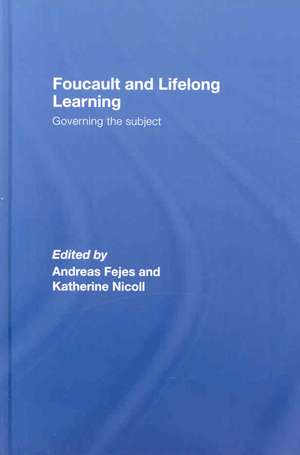Foucault and Lifelong Learning: Governing the Subject
Editat de Andreas Fejes, Katherine Nicollen Limba Engleză Hardback – 17 ian 2008
With a breadth of international contributors and sites of analysis, this book offers insights into such questions as:
- What are the effects of lifelong learning policies within socio-political systems of governance?
- What does lifelong learning do to our understanding of ourselves as citizens?
- How does lifelong learning act in the regulation and re-ordering of what people do?
Preț: 822.54 lei
Preț vechi: 1104.33 lei
-26% Nou
Puncte Express: 1234
Preț estimativ în valută:
157.53€ • 162.30$ • 131.96£
157.53€ • 162.30$ • 131.96£
Carte tipărită la comandă
Livrare economică 22 februarie-08 martie
Preluare comenzi: 021 569.72.76
Specificații
ISBN-13: 9780415424028
ISBN-10: 041542402X
Pagini: 238
Dimensiuni: 156 x 234 mm
Greutate: 0.6 kg
Ediția:1
Editura: Taylor & Francis
Colecția Routledge
Locul publicării:Oxford, United Kingdom
ISBN-10: 041542402X
Pagini: 238
Dimensiuni: 156 x 234 mm
Greutate: 0.6 kg
Ediția:1
Editura: Taylor & Francis
Colecția Routledge
Locul publicării:Oxford, United Kingdom
Cuprins
1. Mobilizing Foucault in studies of lifelong learning Katherine Nicoll and Andreas Fejes Section 1: Governing policy subjects 2. Actively seeking subjects? Richard Edwards 3. Understanding the mechanisms of neoliberal control: lifelong learning flexibility and knowledge capitalism Mark Olssen 4. Our ‘will to learn’ and the assemblage of a learning apparatus Maarten Simons and Jan Masschelein 5. The operation of knowledge and construction of the lifelong learning subject Ulf Olsson and Kenneth Petersson 6. The reason of reason: cosmopolitanism, social exclusion and lifelong learning Thomas S. Popkewitz 7. Historicizing the lifelong learner: governmentality and neoliberal rule Andreas Fejes Section 2: Governing pedagogical subjects 8. Self-governance in the job search: regulative guidelines in job seeking Marinette Fogde 9. Adult learner identities under construction Katarina Sipos Zackrisson and Liselott Assarsson 10. Recognition of prior learning as a technique of governing Per Andersson 11. Pathologizing and medicalizing lifelong learning: a deconstruction Gun Berglund 12. Motivation theory as power in disguise Helene Ahl 13. Discipline and e-learning Katherine Nicoll 14. Academic work and adult education: a site of multiple subjects Nicky Solomon Section 3: Governing subjects 15. Encountering Foucault in lifelong learning Gert Biesta
Notă biografică
Andreas Fejes is a senior lecturer and postdoctoral fellow in Education at Linköping University, Sweden. His research explores lifelong learning and adult education, in particular drawing on poststructuralist theory. He has recently published articles in Journal of Education Policy, Educational Philosophy and Theory, International Journal of Lifelong Education and Teaching in Higher Education.
Dr Katherine Nicoll is a senior lecturer in Education at the University of Stirling, Scotland. Her research explores post-compulsory and professional education and policy, in particular drawing on poststructuralist theory. She has recently published Rhetoric and Educational Discourse: Persuasive Texts? (with R. Edwards, N. Solomon and R. Usher, 2004) and Flexibility and Lifelong Learning: Policy, Discourse and Politics (2006).
Dr Katherine Nicoll is a senior lecturer in Education at the University of Stirling, Scotland. Her research explores post-compulsory and professional education and policy, in particular drawing on poststructuralist theory. She has recently published Rhetoric and Educational Discourse: Persuasive Texts? (with R. Edwards, N. Solomon and R. Usher, 2004) and Flexibility and Lifelong Learning: Policy, Discourse and Politics (2006).
Descriere
Over the last twenty years there has been increasing interest in the work of Michel Foucault in the social sciences and in relation to education in particular. This, the first book to draw on his work to consider lifelong learning, explores the significance of policies and practices of lifelong learning to the wider societies of which they are a part.
